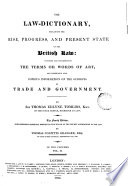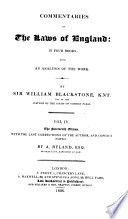 The liberty of the press is indeed essential to the nature of a free state ; but this consists in laying no previous restraints upon publications, and not in freedom from censure for criminal matter, when published. Every freeman has an undoubted right... The liberty of the press is indeed essential to the nature of a free state ; but this consists in laying no previous restraints upon publications, and not in freedom from censure for criminal matter, when published. Every freeman has an undoubted right...  De drukpers als middel tot misdrijf - Page 11by Lamoraal Ulbo de Sitter - 1869 - 215 pagesFull view De drukpers als middel tot misdrijf - Page 11by Lamoraal Ulbo de Sitter - 1869 - 215 pagesFull view - About this book
 | sir William Blackstone - Law - 1825 - 584 pages
...publications, and not in freedom from censure for criminal matter when published. [ 152 ] Every freeman has an undoubted right to lay what sentiments he pleases...he must take the consequence of his own temerity. To subject the press to the restrictive power of a licenser, as was formerly done, both before and... | |
 | Sir William Blackstone - Law - 1825 - 576 pages
...publications, and not in freedom from censure for criminal matter when published. [ 152 ] Every freeman has an undoubted right to lay what sentiments he pleases...he must take the consequence of his own temerity. To subject the press to the restrictive power of a licenser, as was formerly done, both before and... | |
 | Thomas Starkie - Libel and slander - 1826 - 658 pages
...himself. It has been said by a high authority,* that " every freeman has an undoubted right to lay what he pleases before the public — to forbid this is...must take the consequence of his own temerity ."(1) This privilege necessarily includes candid comments upon public affairs, and the mode in which they... | |
 | Thomas Starkie - Libel and slander - 1830 - 474 pages
...It has been asserted by high authority (o), that " every freeman has an undoubted right to lay what he pleases before the public — to forbid this is...he must take the consequence of his own temerity. " On the trial of James Perry and another Qo), on an information for a libel, the attorney-general,... | |
 | Joseph Story - Constitutional history - 1833 - 800 pages
...upon publications, and not in freedom from censure for criminal matter, when published. Every freeman has an undoubted right to lay what sentiments he pleases...improper, mischievous, or illegal, he must take the consequences of his own temerity. To subject the press to the restrictive power of a licenser, as was... | |
 | Thomas Edlyne Tomlins - Law - 1835 - 862 pages
...upon publications ; and not in freedom from censure for criminal matter when published. Every freeman omlins To subject the press to the restrictive power of a licenser, as was formerly done both before and since... | |
 | William Blackstone - Law - 1836 - 704 pages
...publications, and *not in freedom from censure for criminal matter when pub- [*152] lished. Every freeman has an undoubted right to lay what sentiments he pleases...he must take the consequence of his own temerity. To subject the press to the restrictive power of a licenser, as was formerly done, both before and... | |
 | Asia - 1836 - 624 pages
...free man is considered to have an undoubted right to lay what sentiments be pleases before the public, but if he publishes what is improper, mischievous,...he must take the consequence of his own temerity.* In states where the government is despotic, that is, where no representative system exists, and where... | |
 | 1838 - 514 pages
...publications — and not in freedom from censure for criminal matter when published. Every freeman has an undoubted right to lay what sentiments he pleases...he must take the consequence of his own temerity. To subject the press to the restrictive power of a licenser, as was formerly done, is to subject all... | |
 | Thomas George Western, Jean Louis de Lolme - Constitutional law - 1838 - 628 pages
...fitly considered as a part of the common law of the land. Blackstone (1) observes that every freeman has an undoubted right to lay what sentiments he pleases before the public ; to forbid that, is to destroy the freedom of the press ; but if he publishes what is improper, mischievous, or... | |
| |